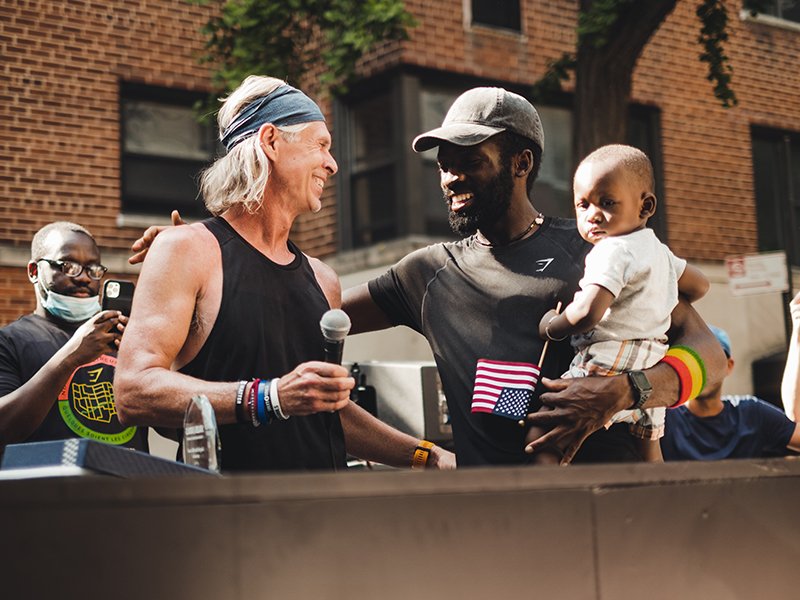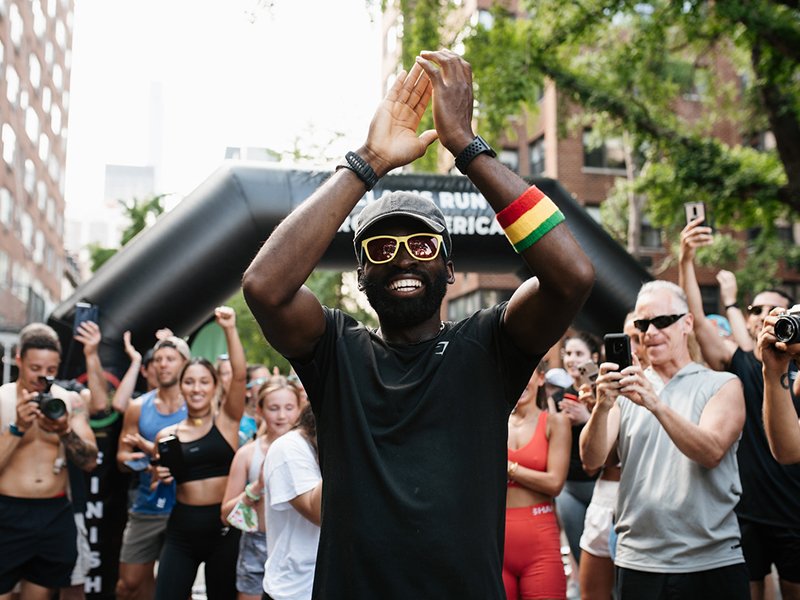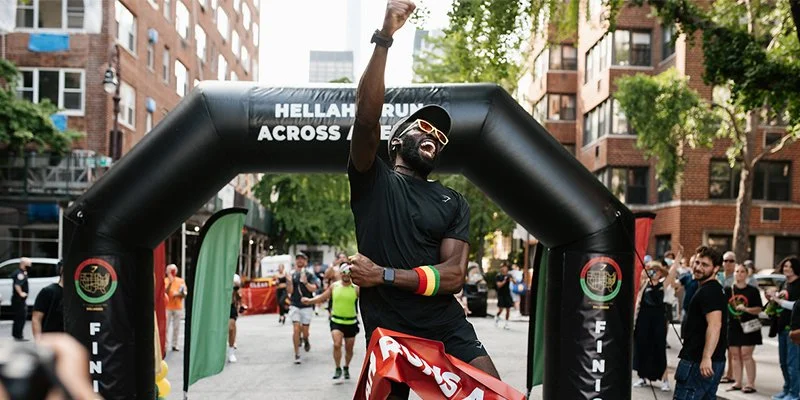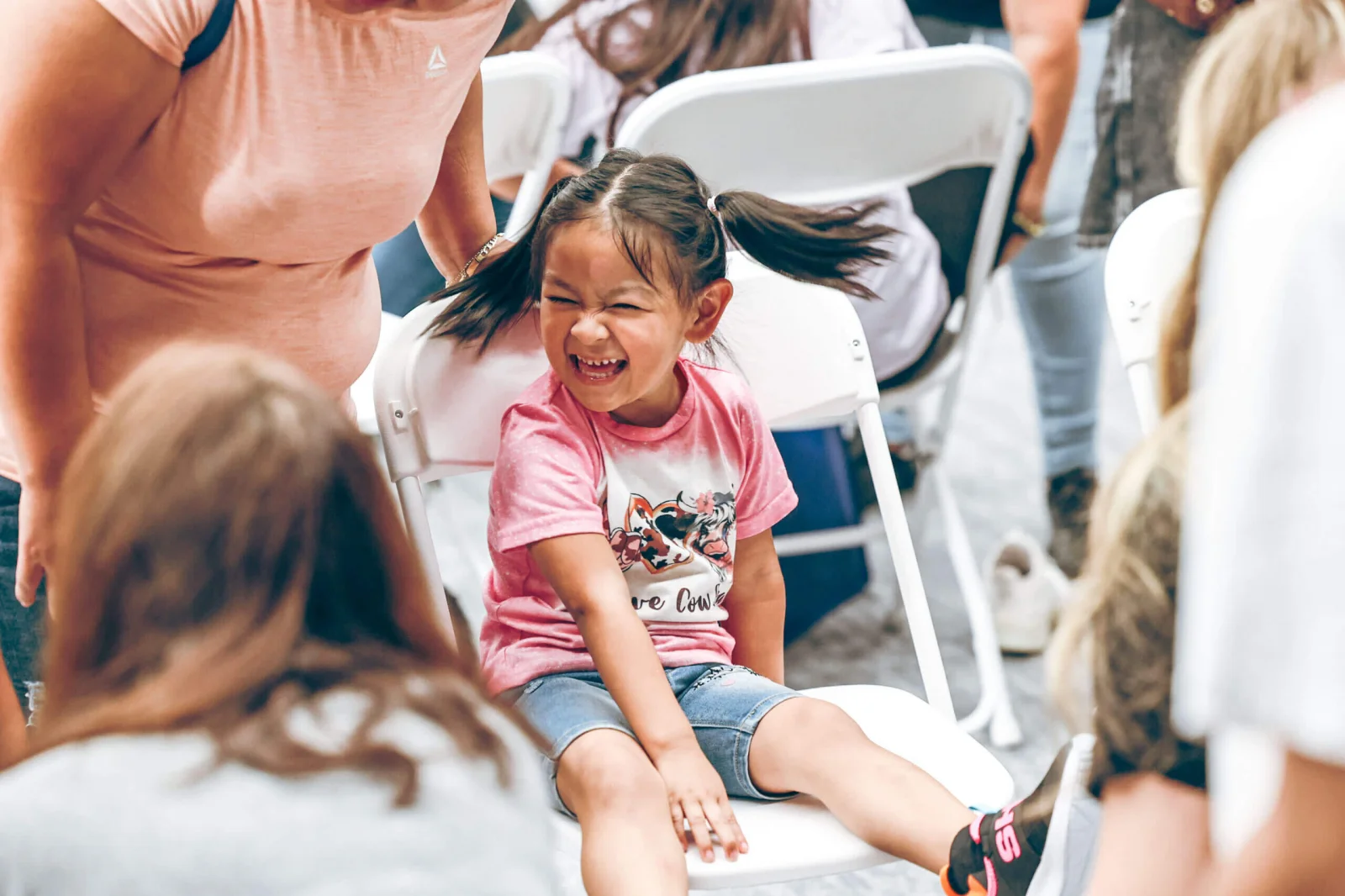On May 23, Hellah Sidibe finished his 84-day transcontinental run across the United States. On behalf of Soles4Souls, to date he has raised $14,409. With a goal of $50,000, Hellah has said just like his run, he doesn’t stop until he reaches his goal.
Our CEO and ultra-runner, Buddy Teaster, joined Hellah on four different occasions across the run, cheering and even coaching him along his journey.
“Running with Hellah was one of the highlights of the year for me. His focus and drive are impressive but both are exceeded by his ability to stay positive no matter the circumstances. It’s also the measure of a person to see who surrounds them and I met some truly amazing people who were there to support and cheer him on. So many people are inspired to do big things because of him. I hope our paths continue to cross for many, many years to come,” said Teaster.
Danielle Cook, Marketing Sponsorship Associate with Gymshark, has worked with Hellah from the beginning to end, sharing how much this run brought her team together.
“Everybody on the team jumped on board and was ready to support him. We believe in community at Gymshark and supporting our athletes, and this was a prime example of how the entire brand came together to support one person,” said Cook.
Last week, we sat down (virtually) for a Q&A with Hellah to learn more about his journey. We are endlessly grateful for his support and proud of all his accomplishments.

Tell me about your childhood. What was it like moving to the U.S?
I was born and raised in Mali in West Africa. I spent half of my life there and the other half in the U.S. I came to the U.S. with my siblings by accident. In ‘95 my dad was at Northern Illinois University on a Fulbright scholarship to get his doctorate degree, and then in ‘97 my mom got accepted to do her master’s. So when she came to the U.S., she brought my youngest brother with her and left my sister and I with her sister in the village. Unfortunately, about halfway into that first year of her watching us, my aunt passed away, and so there was no one to take care of us. So my parents got a J-2 visa and my sister and I came over in 1998. We were only there one year until the visa expired, but I learned English that year. Fast-forward to 2003, my mom was accepted into a doctoral program, and moved us all there to have better education opportunities. I was a freshman in high school then, and have been here ever since. I thought I knew English after that first year, and then when we came back to the U.S., I thought ‘oh boy, everyone here talks so much faster.’ It was tough. There were certain classes I had a hard time with, like math. It was a huge culture shock, even after living here for that first initial year. I had a lot to re-learn, but I remember everything about that time– the good and the bad.
Tell me about your time playing professional soccer.
As a child in Mali, soccer is a way of life. I’ve played since I was young. After high school, I ended up going to the University of Massachusetts Amherst to play Division 1 soccer, and then got the opportunity to play professionally here. There were a lot of international/visa issues, and so I just played on any team I could just because I loved it. After some time and lots of complications with where I could/could not play, I decided to give it a rest.
What made you start running?
In 2017 I was thinking of something new I could do– something I could be in control of. I thought, ‘what do I want to tackle that I’m afraid of?’ Running was the first thing that hit me. With soccer, running is different– you’re attacking, you’re defending… there’s so much besides just running. But when the coaches would make us run on the line or do fitness tests, I never really enjoyed the parts that were just purely running. So I decided to give running a chance to see if I could enjoy it and started off with the goal of going for at least ten mins a day, every day for two weeks. That goal turned into a year, then two… now four, and now I just finished running across the country.
What challenges have you faced over the years while keeping this goal of running everyday?
Year one was really amazing– I was constantly curious because I didn’t know what to expect. Year two I knew what to expect with the seasons and winter conditions, but then also came an injury. It was the year of mental toughness. When I got injured, I had to get home from a run and was holding my tears in– I was in that much pain. I’m not a super emotional person, so that was tough. Year three I re-found my purpose in what I really loved about running. I wanted to face whatever came, which is why I also made it the goal to only run outside everyday. There are days where I feel like I am barely making it through the run, but I hold onto that goal, and eventually those feelings go away. I also lost my cousin and my uncle during this time. But running helps you build a callus. Losing someone is one of the worst things you can go through, and those were the days that were hardest to get up and run. But when I did, I’d run even harder. It’s my way of coping. I see running as a privilege too that not everyone can do, so in the back of my head, I’m running on their behalf. I need a bigger reason behind it.
Over the years, what/who has inspired you?
My mom has always been my inspiration. When she was here on her Fulbright scholarship, she got to go to school for free, but with that came limitations on the number of hours she could work outside of school. She was only making $12,000 a year, and taking care of me, my sister and brother. She would hide that from us– I had no idea. Anything we needed like school stuff or cleats, she would get, but we had no idea it was a struggle. I look back at that and it drives me for a lot of the stuff that I do. But generally, I’m not the kind of person that needs something to be inspired by– I find it within myself always. I think that’s the athlete mentality in me– ‘you get up, and you get it done.’ For me, I just need to have a goal to tackle, and I’ll find a way to do it. You can look up to someone, but it’s always up to you to get up and take action.
When you decided to run across the country, how did your friends and family react?
I first told Alexa, my fiancé, but girlfriend during this time. Her first reaction was, “Nope. You’re not doing it” because I’m always saying things like, “I’m going to get up today and run 50 miles,” without even preparing for it. So we talked about it and started doing the research. I had no knowledge of what I was committing to. After discussing, I said I wanted to do it for something– something that I could relate to. There’s so many awesome nonprofits out there, and Alexa is actually the one who found Soles4Souls. She brought it to my attention and my immediate response was, “yes, this is perfect.” I didn’t have pairs of shoes that fit for years living in Africa, and for kids there it’s not even just a luxury, it’s for safety. All you need is a good pair of shoes to go on a run.
Why were you drawn to our mission and work?
You know what I really love about what you guys do? You help millions across the world, but I think it’s really cool that you don’t forget about the U.S. I’m from a third-world country and I’d be more than happy for you to help a third-world country– a child in the street, or parents that can’t feed their family. But it’s crazy to me that as a first-world country and the most powerful country in the world, that there are still people here that don’t have shoes. So I feel like it was really good to see that not only are you helping others, but you’re helping people here. I have a lot of pride saying I’m a U.S. citizen, but I’ll never forget where I came from.
Can you share some highlights from your 84 day journey?
I loved running through the Navajo reservation. Before the run, I had heard about it but honestly had no idea where it even was until I got there. But the people are incredible. People all over cheering you on, offering you rides and water. The word travels quickly in the reservation. By the time we got to one point, people were already waiting for us. They were giving me gifts like keychain necklaces. And even though the elevation was kicking my butt, the mountain views were incredible. Across the journey, you realize how many good people there are in the U.S. versus bad. It gives you a lot of hope about humanity.
What challenges did you face throughout the run? I read about your experiences with racism in Missouri. How did that impact you?
I give people the benefit of the doubt, so I was shocked. When I heard those racial slurs, I was like “Wait what? Did this just happen?” I didn’t even know how to react. I froze for a second. I yelled, “Come on!” but tried not to let my anger overtake the purpose of this run. The school principal in the area reached out, and before I knew it a lot of the town was apologizing and asking out about how to donate to the cause. People were saying things like “I’m ashamed of my town.” Even an officer reached out about information to see if he could identify the vehicle that drove by. If I were to see those kids again, I’d probably say something like, “I don’t have any hate for you, I just want you to know to be careful with what you say to people. What is it that I did to you or someone that looks different than you did?” I’d just want them to understand that they can be better than that. It was tough, on top of the terrain there and even some encounters with snakes. It all was adding up… even seeing racial flags. It’s crazy seeing young innocent kids having fun, playing in their backyard, clueless about what’s hard and what’s not… and then you look in front of their house and see these flags. It’s sad to see that because it’s not their fault, they’re just brought up into that environment. For me, this run was about Soles4Souls, but more importantly about just bringing people together, and not focus on the negativity. I didn’t judge all the people in that state, especially after seeing so many people come together afterwards. Most people try to do the right thing.
You’re one of only a few black men who’ve made this cross-country journey. What would you say to other men or women of color who have thought about doing this or something like it?
It doesn’t matter who you are or where you’re from– your gender, ethnicity, or walks on earth. We can do anything we really want to do. Don’t let anyone label you. As long as you want to do something, get up and do it. People expect certain types of people to do certain types of things, but seeing the diverse men and women who’ve done this cross-country journey before me is really incredible.
Since finishing the race, what responses have you received from those who followed your journey? How have you been feeling?
It’s all been positive. I feel bad I haven’t had time to respond to everyone– I still have text messages sitting. The whole town showed up when I finished. I live in a small town and 4,300 people were there, the firetrucks showed up, they hung a big American flag. The police escorted us to New York City to the finish line. It was a party on 50th Avenue– the music was blasting. It was an awesome experience overall. It really hit me at the finish line thinking about all the people who took time out of their days to be part of this. My team, sponsors at Gymshark and I did this from L.A. to New York City, so it was really a celebration for all of us. The saying goes, “it takes a village to raise a child.” I felt like I was that child because everyone had to come together to make my dream of running across the country a reality.

What did it feel like receiving the award from Soles4Souls?
I saw Buddy coming up and carrying these boxes, and I was totally surprised. It was incredible. Having Buddy, an ultra-runner, join me on four different occasions throughout the run was amazing. He did everything to make it easy for me– he was just there to help. It was really cool to connect and learn from him and hear even more about Soles4Souls. He helped me on so many days that could have felt much longer– days that I would have to make up extra mileage. He helped in ways I can’t explain… with the pacing, approaching curves, making sure you’re on the good side. It was incredible having him help me throughout the process.
What’s next for you?
That’s a challenge within itself. I just need to be patient and let my body heal. I’m still running, and next week I’m going to start strength training. I want to do a 100-mile race next. There’s another goal I have in mind too, but haven’t announced publicly yet.
Photography by Sam Glennon and Garret Torres
To continue to support Hellah in his fundraising goal, visit here.


